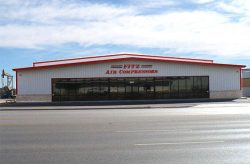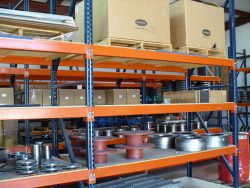Air Compressor Safety: How to Avoid Injuries
Compressed air is used to power various tools and equipment within industrial and manufacturing settings. However, given how commonplace compressed air is within these environments, it’s easy to forget about the potential hazards it poses to workers who handle air compressors regularly.
Regardless of how compressed air is used in your facility, it is essential to prioritize air compressor safety at all times to avoid workplace disasters that can cause injury.
This blog will cover the different compressed air hazards in the workplace and air compressor safety tips to ensure a safe and productive work environment.
Compressed Air Hazards
Improper Usage
When handling compressed air, it is important to note that air compressors are high-powered pieces of equipment that let out pressurized air. Unsafe practices like pointing hoses at yourself or another person can result in one or more of the following injuries:
- Internal Rupture – occurs when the compressor hose is used to blow air into the mouth, causing pressurized air to hit the lungs, stomach, or intestines.
- Broken Skin – highly-pressurized air can penetrate the skin and enter the bloodstream, leading to complications and even death later on.
- Blindness – damage to the eyes due to highly-pressurized air can be substantial and lead to blindness.
Other risks posed by compressed air include physical injuries and property damage caused by flying projectiles.
Damaged Hoses
Compressed air hoses safety is crucial in ensuring the performance of the compressor. Damage to the hoses can cause air to leak out, causing pressure to drop within the compressor and cause it to malfunction. But it poses an even greater risk when it is pressurized.
Since its integrity is compromised, it can disengage at any time, causing a rapid release of pressure similar to that of an explosion and can cause severe injury to anyone in the vicinity. This further highlights the need for compressed air hoses safety.
Over-Inflating
Workers handling air compressors must always know about the air and pressure requirements of things they inflate. Overinflation may cause the object, such as a tire or balloon, to rupture instantly or after a later time, which may lead to serious injury. A tire, for example, can explode as it is being inflated, causing serious injury to the person inflating it. Meanwhile, an overinflated tire may also explode while on the road and cause a road accident, which could be potentially life-threatening.
Poor Maintenance
Neglecting to subject tools powered by the compressor to regular maintenance may cause them to seize up during operation, leading to workplace injuries. For example, tools like pneumatic hammers or drills use very high pressure to operate correctly and could stall while in use, posting significant risk on the operator.
Too Much Pressure
The air compressor itself is also a safety hazard when not subjected to regular maintenance. That means frequent oil changes, replacement of damaged electrical cords, and inspection of pressure gauges, among other things, to ensure that they are all working correctly. Otherwise, the machine can accumulate too much pressure and may explode at any given time.
Compressed Air Safety Rules To Follow
Setting Up Equipment
The setup inside your facility can significantly impact safety. Take note of the following set up air compressor safety tips to ensure a safe working environment:
- Take note of the pressure ratings of hoses, pipes, and fittings to ensure they are compatible with the air compressor’s maximum pressure.
- Never attempt to bypass, adjust, or remove pressure relief valves.
- Keep electric drain valves elevated at least one and a half feet above the ground and away from moisture.
- Always keep the shutoff valve visible and within reach.
- Improve air circulation in your workspace to keep it free from carbon monoxide and other air pollutants, as well as keep the humidity levels low.
Safety Checks Before Operation
Performing safety checks before operating the compressor is crucial in eliminating safety risks and ensuring that it works properly. Include the following in your checklist:
- Ensure that oil levels in the compressor are adequate before turning it on.
- Lubricate pneumatic tools regularly to increase operational efficiency.
- Check if fuel levels are sufficient to avoid refueling in the middle of a job. In case you have to refuel, allow adequate time for the machine to completely cool down before refueling.
- Ensure that air filters are clean and dust-free or need to be replaced.
- Secure the connection between the compressor and air source.
- Plug the compressor in properly grounded outlets to avoid damaging its electrical circuitry.
- Ensure that all connected tools are properly turned off before turning on the machine.
During Maintenance
Regular preventive maintenance is essential to ensure smooth operation and avoid costly emergency repairs later. The following are some tips on how to carry out maintenance work on your air compressor safely:
- Ensure that the machine is properly turned off and disconnected from the power source before performing any maintenance work.
- Use soapy water or a lye solution to clean the air compressor and its various components.
- Lubricate the machine using oils that have high flashpoints. Use proper oils and avoid overlubricating to prevent corrosion.
- Drain the tank using the underside valve. Make sure to do it daily to avoid the accumulation of liquid.
- If corrosion occurs on the tank, never attempt to repair it. Replace the tank immediately.
- Take note of the time spent doing maintenance work. If the time spent is significantly beyond the regular, report the issue immediately to be repaired. Make sure to remove all connections and tag them out so no one uses them.
General Compressed Air Safety Rules
Safety is not a task to be performed but a habit that must be practiced at all times. Here are some general safety tips to follow while in the workplace:
- Ensure all cables, wires, and hoses are tucked away to eliminate tripping hazards.
- Take note of the compressor’s voltage to see whether it performs at an optimal level. Any deviation could indicate a problem and should be powered down, disconnected from the power source, and the pressure purged to prepare it for repair.
- Never operate an indoor compressor outside to avoid electrical problems.
- Regularly check the air source for optimal efficiency. Make sure it is free from moisture and particulate matter.
Talk To The Experts
Safety is an important habit to master in the workplace to ensure the protection and productivity of your workforce. But the most significant factor that plays into maintaining a safe working environment is using the proper equipment. Your equipment should be able to satisfy your performance requirements and keep up with high demands without having to go beyond their limits. If you need assistance with equipment selection and maintenance, talk to us and we will be happy to help you.




